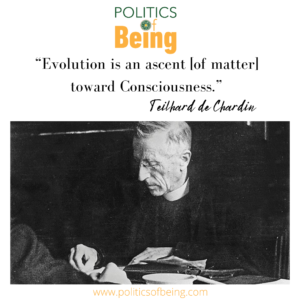
Teilhard de Chardin and the “Noosphere” Emergence
From the book chapter: An Evolutionary Crisis
The third famous spiritual teacher who perceived humankind’s ongoing spiritual evolution came from the Western world. Pierre Teilhard de Chardin (1881–1955) was a French scientist, philosopher, and Jesuit priest. His study and work as a paleontologist and geologist led him to reflect on the evolutionary process of the universe, from primordial particles to the development of life and human beings, from the geosphere to the biosphere, and finally what he called the “noosphere,” “the sphere of human thought.” Inspired by French philosopher Henri Bergson’s view on “creative evolution,” Teilhard de Chardin perceived in the evolutionary process a clear direction toward an ever-increasing level of material complexity and consciousness: “Evolution is an ascent [of matter] toward consciousness.”
Teilhard de Chardin thought evolution was bound to achieve a supreme consciousness, which he called the “omega point,” which was “pulling” all creation toward it. This would be achieved by the future of humankind, that would realize its psychic unity, a process he termed “unanimization.” Teilhard de Chardin wrote that he first had the vision of the “noosphere,” which he considered “Earth’s own soul,” during World War I, in the trench warfare from Yser to Verdun, where he spent months serving as a stretcher bearer. In this extreme physical, psychic, and energetic density, where a million men were fighting each other, he started to perceive an evolutionary process, not at all distinct but rather of the same kind of physical matter’s evolution he had studied. He proclaimed:
A new Faith, in which the ascensional Faith that rises up towards a transcendent, and the propulsive Faith that drives towards an Immanent, for a single compound – a new Charity in which all the Earth’s dynamic passions combine as they are divinized: it is this, I now see with a vision that will never leave me, that the World is desperately in need of at this very moment, if it is not to collapse.
Teilhard de Chardin’s work, which has had a profound impact among scientific and spiritual communities, was first condemned by the Catholic Church before being finally rehabilitated with great recognition by leading figures such as Pope Benedict XVI and Pope Francis.
